Lots of people will choose what to feed their guinea pigs based on costs and popularity. Asparagus is one of those vegetables that are really healthy, but at the same time, quite expensive. This is good for people, but what about the guinea pigs?
Can guinea pigs eat asparagus? Guinea pigs can eat asparagus as they contain a lot of minerals and vitamins, which are vital for the guinea pig’s overall health. Asparagus is especially good for the digestive system. The only downsides are the price when compared to other vegetables and the level of calcium.
If you are introducing this vegetable for the first time, you need to keep a closer watch on your guinea pig. This rule is applied to everything new that is being added to the guinea pig’s diet.
In the following sections, we have made an in-depth review of asparagus as potential food for the guinea pigs. This includes health benefits, risks, nutrition facts, serving size, frequency, and more. Let’s begin!
Table of Content
Is Asparagus Good for Guinea Pigs? | Health Benefits
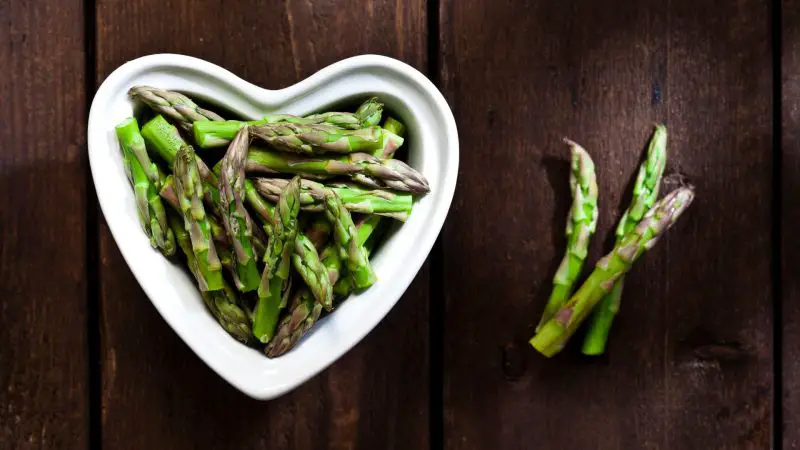
There are numerous health benefits that can be attributed to asparagus. Some of them are the following:
Scurvy Prevention
Guinea pigs don’t produce vitamin C within their bodies. With vitamin C deficiency, they can get a disease called scurvy which can sometimes be even fatal. Vitamin C in asparagus can be beneficial for them.
Still, these levels of vitamin C in asparagus are not enough for guinea pigs. So, it’s essential to provide them with other foods that are rich in this vital vitamin for guinea pigs.
Antioxidants
Like any other greeny vegetable, asparagus is a good source of antioxidants. There is a good amount of vitamin E that has antioxidant properties, which means that it can protect the guinea pig’s body from free radical damage.
Also, beta-carotene, lutein, and zeaxanthin in the asparagus act as antioxidants that also protect guinea pigs from free radicals. In addition, it also reduces cholesterol and improves eyesight.
Improving Digestion
As we already know, dietary fiber is essential for a healthy diet and proper digestion. Also, it is useful for reducing blood pressure and protecting from heart diseases. It helps in losing weight and prevents diabetes. So, feeding asparagus to guinea pigs is beneficial to their overall health due to the presence of dietary fiber.
Better Bone Health
Asparagus has some benefits for guinea pig’s bones because of the presence of vitamin K and magnesium. There is a good amount of vitamin K and magnesium that help with the growth and development of healthy and strong bones, but also teeth in guinea pigs.
Healthy Blood and Control of Blood Pressure
Asparagus is a good source of potassium, which is effective in lowering high blood pressure. This consequently makes the overall cardiovascular system healthy. Also, iron and copper together are good for healthy blood and blood vessels. The deficit of iron can cause anemia and a bad immune system, so this nutrient is essential for guinea pigs as well.
Boosts the Immune System
Asparagus contains many nutrients that keep the immune system in good shape. In addition to giving a proper diet to your guinea pigs, you will help them with their digestive problems as the fiber-rich vegetables enhance digestion. Most importantly, never forget that asparagus is a vegetable that comes loaded with anti-inflammatory properties, blood circulation abilities, and helps in improving the health of the guinea pig’s heart.
Nutrition Facts of Asparagus for Guinea Pigs
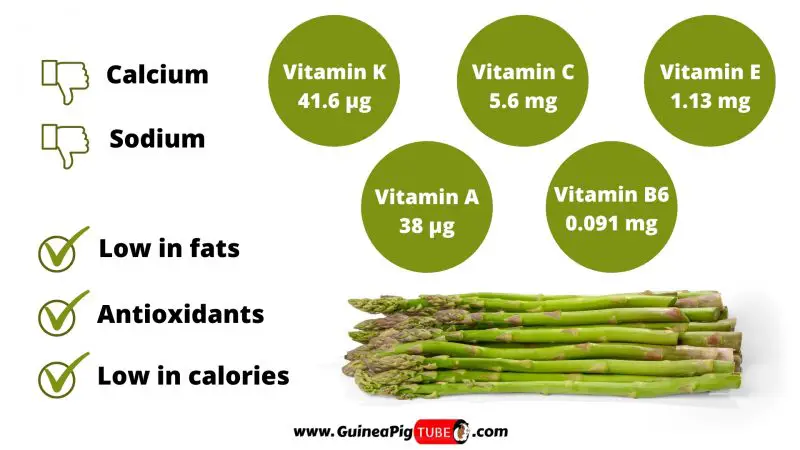
The following are the nutrition facts for 100 g of the asparagus:
- Energy – 20 kcal
- Protein – 2.2 g
- Total lipid (fat) – 0.12 g
- Carbs – 3.88 g
- Dietary Fiber – 2.1 g
- Sugars – 1.88 g
- Calcium – 24 mg
- Iron – 2.14 mg
- Magnesium – 14 mg
- Phosphorus – 52 mg
- Potassium – 202 mg
- Sodium – 2 mg
- Copper – 0.189 mg
- Vitamin C – 5.6 mg
- Vitamin B-6 – 0.091 mg
- Vitamin A – 38 µg
- Vitamin E – 1.13 mg
- Vitamin K – 41.6 µg
- Carotene, beta – 449 µg
- Lutein + zeaxanthin – 710 µg
Is Asparagus Poisonous to Guinea Pigs? | Possible Risks
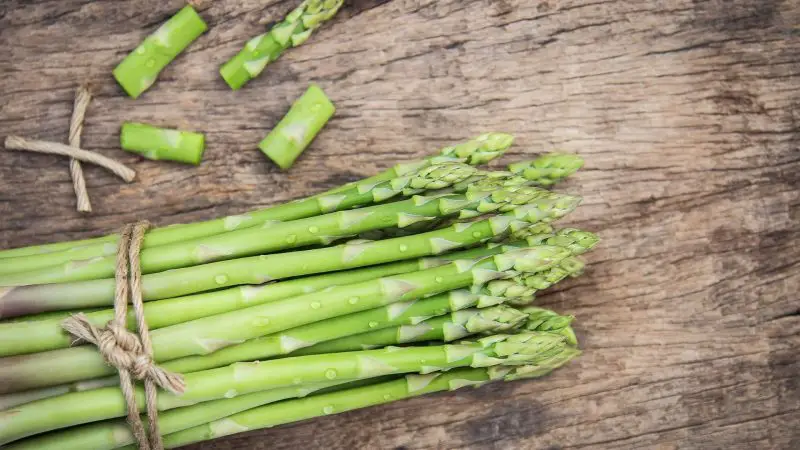
Urinary Problems
Calcium and sodium in asparagus are not good for adult guinea pigs. When they are babies, they need calcium for growth. Sadly, this is not the case with adult guinea pigs as they need foods that are low in calcium. This is because an excess of calcium and sodium can cause severe urinary problems to them, as well as bladder or kidney stones.
Although asparagus does not have too much calcium (unlike many other vegetables), it’s very important to be careful and feed them asparagus only in moderation.
Diarrhea and Other Stomach Problems
If you give too much asparagus to your guinea pigs, some uncomfortable side effects such as diarrhea, bloating, and gases can appear. We recommend that you avoid feeding them with too much asparagus at once because overfeeding can cause serious stomach problems.
Their digestive system is really fragile and diarrhea is one of the most common problems that come with an unbalanced diet. There is also some sugar in the asparagus that can be harmful to their digestive system if you overfeed them.
Allergies
It is also possible that your guinea pigs may be allergic to asparagus. If you are feeding asparagus to guinea pigs for the first time, it’s recommended to first give them a small amount in order to see if any symptoms will occur. The most common symptoms are vomiting, diarrhea, sneezing, and a runny nose.
Serving Size and Frequency of Asparagus for Guinea Pigs
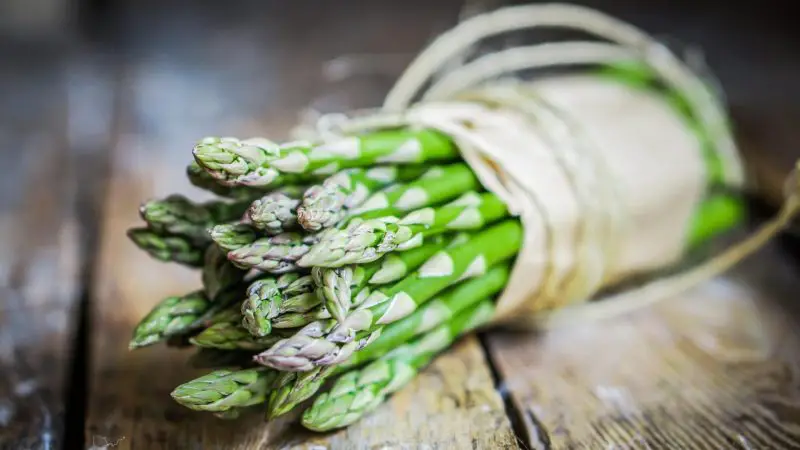
Can Guinea Pigs Have Asparagus Every Day?
Guinea pigs shouldn’t eat asparagus daily. Avoid making asparagus an everyday diet item for them to prevent health complications that would arise from the accumulation of some vitamins or elements in your guinea pig’s body.
Your guinea pigs can enjoy the nutritious asparagus once or twice a week to have a good and healthy diet. There are also other vegetables and fruits, which you can include in their daily diets, such as broccoli, cucumbers, kale, zucchini, and many others. A balance between the intake of asparagus and other foods should be kept to ensure that your guinea pigs have a rich and diverse diet.
How Much Asparagus Can Guinea Pigs Eat?
Asparagus is safe for guinea pigs, but one fact to follow while feeding asparagus to your guinea pig is that ¼ of a cup of this vegetable is sufficient for your guinea pig’s health. Ensure it’s fresh and well washed before feeding asparagus to the guinea pig. This will eliminate the chances of feeding your pet with a vegetable that has some residual effect of pesticides on its surface. Thus, it is advisable to buy organic ones.
If you feed asparagus to the guinea pigs, always ensure it’s raw. Next, you can choose to either feed asparagus by itself or mix it with other foods. But most importantly, keep an eye on the quantity your pet consumes to avoid causing them any stomach issues. Excess consumption of asparagus leads to subsequent constipation and gases, which are not very comfortable for the guinea pig.
Can Baby Guinea Pigs Eat Asparagus?
Baby guinea pigs can’t eat asparagus. During that period of their life, they need a special diet, which includes only fresh alfalfa hay, water, and their mother’s milk. After some time, you can slowly introduce them to vegetables and fruits.
Carefully introduce new things into your guinea pig’s diet. If you notice diarrhea or bloating, quit feeding the guinea pig and provide it with some water. In case you don’t see anything suspicious, you can proceed with the feeding process.
More Information About Guinea Pigs and Asparagus
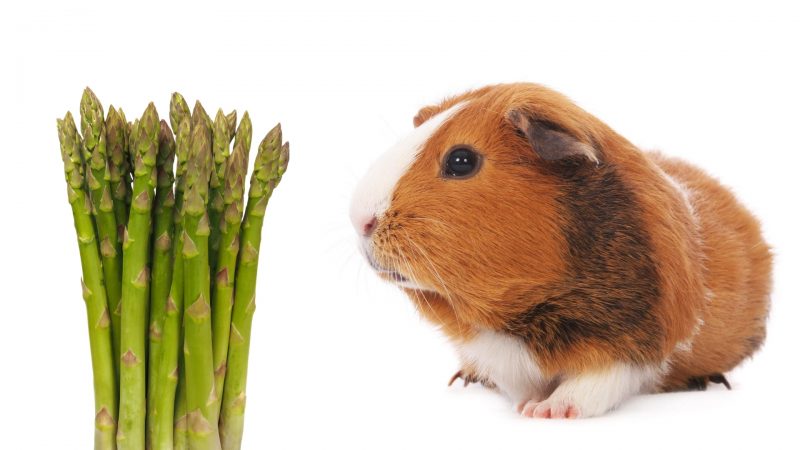
Can Guinea Pigs Eat Asparagus Stalks/Asparagus Stems?
Guinea pigs can eat asparagus stems or stalks, and they are entirely safe for them. They will enjoy eating these stalks because they love chewing things, as that process is good for their teeth. Just be careful with the serving sizes, and the frequency of the asparagus stalks for guinea pigs.
Can Guinea Pigs Eat Asparagus Tips?
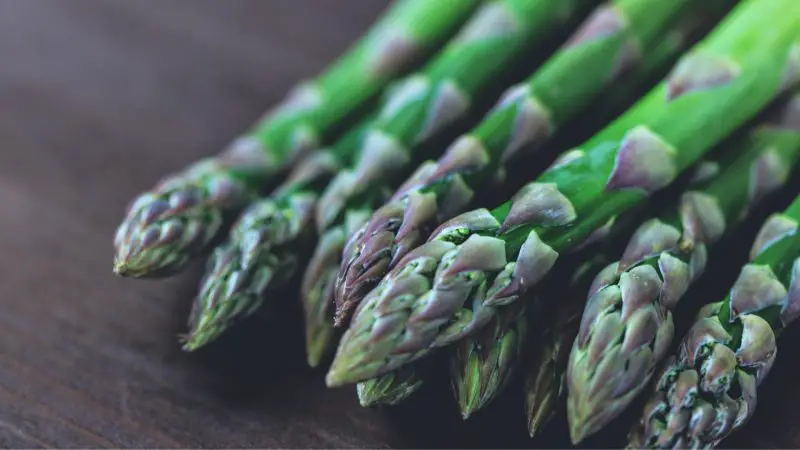
Guinea pigs can eat asparagus tips and they are very delicious to them. Before giving asparagus tips to the guinea pigs, it’s best to first wash them thoroughly with water in order to remove possible insects and pesticides.
Also, be careful with the serving sizes and give them only fresh asparagus tips that don’t have a change in color.
Can Guinea Pigs Eat Asparagus Ends?
Although people don’t eat raw ends of asparagus and use it usually only for soups, guinea pigs can eat asparagus ends without any problems. These ends have a tough and fibrous texture.
Therefore, guinea pigs can use them as toys for chewing. Maybe your guinea pigs will be fond of eating asparagus ends, and that’s normal. Every guinea pig has a different taste preference. If this is the case, you can give them other parts of asparagus.
Can Guinea Pigs Eat Cooked Asparagus?
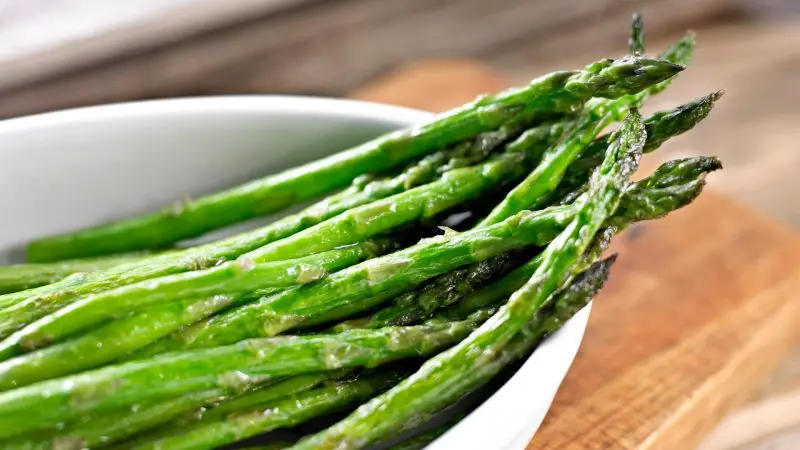
In general, you should never give them cooked food. Thus, guinea pigs can’t eat cooked asparagus. Though asparagus is a highly nutritious vegetable for your cavies, it does not negate the fact that guinea pigs do not feed on cooked food.
So, always feed them with raw and fresh asparagus.
Guinea pigs’ digestive system isn’t made to digest cooked food. So, you need to avoid any cooked or processed food in their diet.
You can nourish your guinea pig’s diet with asparagus as long as they are fresh, raw, and fed in moderation.
Quick Facts About Asparagus
The following are some interesting facts on asparagus:
- Asparagus has a long history and it has been cultivated for 2,500 years.
- Green and white asparagus come from the same plant, but there is a difference in nutritional value when you compare the two of them.
- A surprising fact is asparagus can spend on average up to three years in the ground before being harvested.
- Asparagus loves the warm weather and with the right temperature conditions (around 90 degrees), it can grow up to 7 inches in a single day.
- When it comes to asparagus production, California as a state is ranked very high but not surprising as it has a favorable climate for this plant.
- The name Asparagus derives its origins from the Greek word aspharagos which means “sprout” or “shoot.”
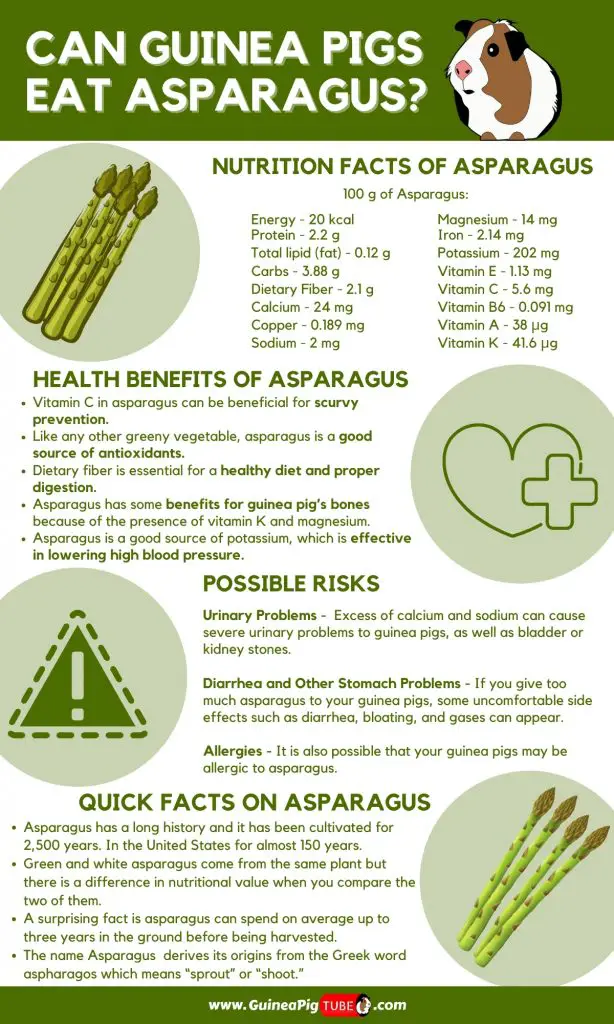
We have also made a full list of foods that guinea pigs can and can’t eat (150+ Types of Foods). Be sure to also check our recommended products page for everything you will ever need to assure a happy life for your guinea pigs. Hope this information was helpful and you have found the answer you were looking for.
List of Sources
Nutrient Requirements of Laboratory Animals: Fourth Revised Edition
Chemical Constituents of Asparagus
The Effects of Diet on Anatomy, Physiology and Health in the Guinea Pig
